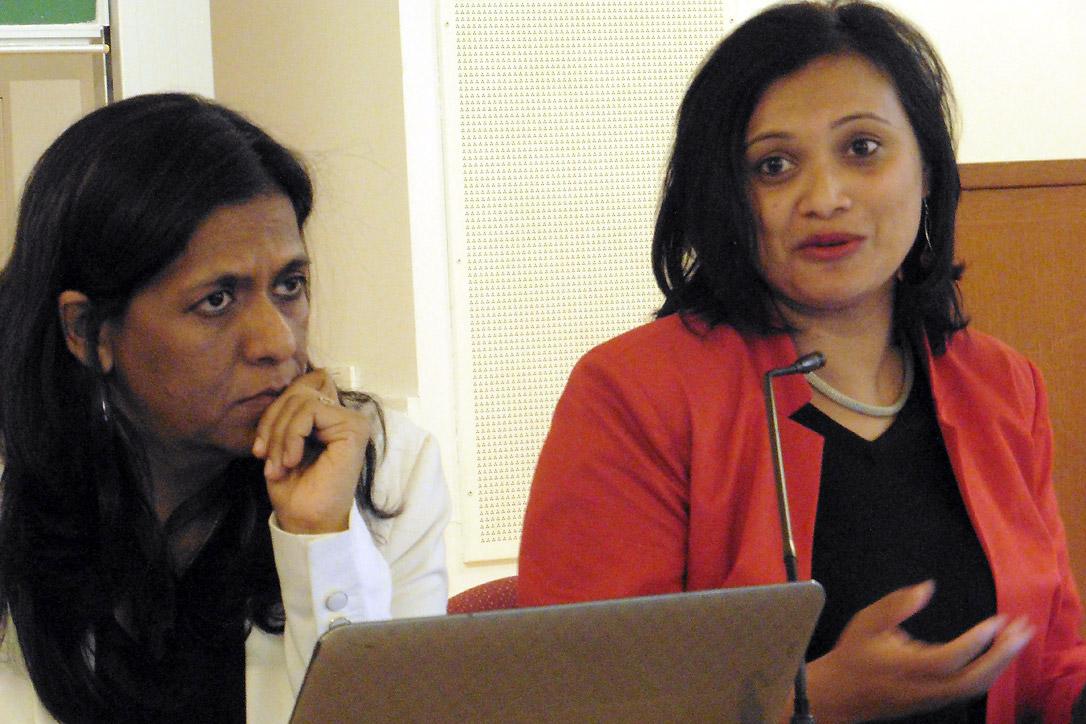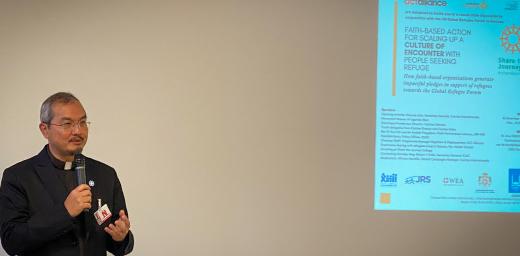A unique combination of academic and spiritual encounters

Dr Fatima Seedat (left) and Prof. Sarojini Nadar at the conference which explained how patriarchy and its implications for violence against women has become part of teaching scriptural hermeneutics together in a Christian-Muslim classroom at the University of KwaZulu-Natal, South Africa. Photo: LWF/S. Sinn
(LWI) – A series of consultations for Christian and Muslim scholars organized by The Lutheran World Federation (LWF) in partnership with academic institutions is growing into a network of scholars and people of faith seeking deeper conversations about interpreting sacred scriptures in different situations across the world.
“It was encouraging to see that the LWF together with academic institutions provides a unique space for Christian-Muslim conversations, in which we jointly explore sacred scriptures as important treasures for our faith communities. We can also address challenging ethical questions together,” noted Rev. Dr Simone Sinn, LWF study secretary for Public Theology and Interreligious Relations.
Sinn was referring to the 10 - 13 March 2016 LWF-initiated Christian-Muslim consultation on “Transformative Readings of Sacred Scriptures,” held at the Faculty of Theology, University of Oslo, Norway. This was the second conference in a series that started in 2014.
The opening presentations by Prof. Mouhanad Khorchide and Rev. Dr Kenneth Mtata, LWF study secretary for Lutheran Theology and Practice, provided insights into recent scholarly research on the Qur’an and Bible. It became clear in both presentations that the meaning of the text emerges in the act of reading. Therefore understanding how the first recipient communicates becomes an important part of studying scripture.
Khorchide, director of the Center for Islamic Theology, of the University of Münster, Germany, spoke on the topic “The authors of the Quran are still alive - The Quran as an act of communication.” He underlined that Islam’s holy book develops its message in interaction with the reader, and its speech “achieves another meaning in the life of the individual every time it is read.”
Prof. Stefan Schreiner, faculty of theology at Tübingen University, Germany, explored the relationship between the two sacred books. He explained that from the very beginning, Qur’an commentators made the study of the Bible part of their exegetical efforts and widely used biblical material in their respective works, which gave rise to intertwined histories.
Prof. Oddbjorn Leivik, faculty of theology at the Oslo university, looked at “problematic texts” in the Bible and Qur’an, and identified hermeneutical strategies by ordinary believers and theologians to tackle such texts. He examined discussions on the concept of hell in Christian circles, and the way in which popular Muslim discourse addresses religion and violence.
It was encouraging to see that the LWF with academic institutions provides a unique space for Christian-Muslim conversations, in which we jointly explore sacred scriptures as important treasures for our faith communities.
Patriarchy and violence against women
Assistant Professor Anne Hege Grung from Oslo presented results of a case study showing how Christian and Muslim women today read scriptural passages that condone patriarchically and are used to justify violence against women. Women have named the dangerous potential of such texts, and seek strategies for constructive transformation in the reading process, she noted.
Furthermore, Prof. Sarojini Nadar and Dr Fatima Seedat from the University of KwaZulu-Natal in South Africa, presented their experiences of lecturing together on hermeneutics in a classroom that includes students from Christian and Muslim backgrounds. They said their role as teachers was “to hold onto the tension in the space between the feminist approaches to the sacred texts, and to not succumb to the pressure to release, trivialize or exacerbate the tension.”
Living side by side
The Oslo meeting also provided space to learn about the day-to-day challenges of people of faith living side by side. Prof. Samuel Frouisou, academic dean at the Protestant University of Yaounde, Cameroon, illustrated how nurturing constructive relations between religious communities helps deal with the threat of violence by militant groups. Christians would protect mosques during the Friday prayers, and Muslims would guard churches during Sunday worship so each community could pray without fear.
The consultation had 32 participants from 11 countries. Students and staff from the University of Oslo also attended the open sessions. Over the two years, a diverse group of Muslim and Christian scholars has also explored the role of religion in the public space.
The faculty of theology in Oslo and the Center for Islamic Theology in Münster are interested in continuing the partnership with the LWF, and there is commitment for a next joint consultation, Sinn added.





